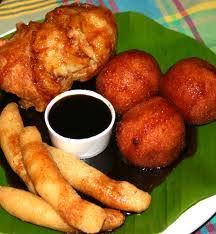Salvadorean life style
Gastronomy of El
Salvador
Cuisine in the country is traditionally
combination of the foods of the indigenous and Spain population, particularly
in the Lenca, Pipil, and Maya individuals. Several dishes are prepared with
corn. Common soups in the country are Gallo en chicha (prepared with corns,
rooster, and dulce de tapa), and Sopa de pata (made from plantain, cow's feet,
corn and tripe). The usual breakfasts by Salvadorans are Huevos picados
(scrambled eggs combined with vegetables), Casamiento (also known as rice and
black beans) and Platos típicos. Some of the popular dishes in the country are
Pupusas (prepared with corn, cheese, beans or meat), Pollo Encebollado
(prepared with chicken and onions, also a well-liked home style dish all over
Central America), Pavo Salvadoreño (Salvadoran style of roast turkey with a
mixture of spices and vegetables) and Plátanos Fritos.
Typical Salvadoran
desserts are Arroz en Leche, Atol de Elote, Atol de Piña, Dulce de leche,
Empanadas de Platano, Marquezote, Pan Dulce, Poleada, Salpores, Torta de Yema,
Zemita, Quesadilla (Salvadoran style) and fruits (bananas, mangoes and papayas
are well-liked). Salvadoran typically drinks coffee and soft drinks or
gaseosas. The most popular local soft drink is the Kolachampan with sugar cane
flavor. Other beverages in the country are atol de elote (made of fresh corn),
horchata (combine of spices suchlike almonds, barley, cinnamon, sesame seed and
rice), licuados (similar to minutas with fresh fruit and milk), masa (corn
meal), minutas (with natural flavored syrup), refrescos (made of sweetened
fruit drinks or lemonade), tamarind juice and coconut milk. Beer or cerveza is
the usual alcoholic beverage in the country and Pilsener is the most common
label.
Salvadorean Festivals and Events
Holy Week
This
important El Salvador Tradition is a religious festival known as Semana Santa
in the Spanish-speaking world and features a carnival-like atmosphere across
Latin America. Best experienced in San Salvador with street parades and
performance art, the week-long event is usually held in late March through
Easter Sunday.
Palm Festival
The
Panchimalco Flower and Palm Festival in May is a good time to take in local
culture. Admire beautiful floral arrangements and garlands displayed throughout
the towns, villages and beach resorts nationwide. Accompanying the event is
music and traditional dress.
The best time to be in Santa Ana—though perhaps not if you want peace and quiet—is Fiesta Julias which runs through the month of July. There are street parades, masses and cultural events galore in this most colonial of Salvadoran cities. There are also fairground rides and clowns for the kids.
August Festival
Of all El Salvador Holidays, Fiestas Agostinas, in early August is one of the most popular ones. Held in the capital of San Salvador, a marching band wakes the city up at 4:00 a.m., after which parades, sports, food, and art exhibitions take place.
Fireballs Festival
This
fun, fiery event in late August is held in Nejapa—just north of San
Salvador—and sees fire-throwers with elaborately painted faces on the streets
and a general appearance of anarchy.
September 15 marks El Salvador's independence from Spain in 1821 with flag-waving, parades and fireworks on the beaches, in the cities and mountain towns. The biggest national day celebrations take place in San Salvador.
San Miguel Carnival
November in San Miguel is party time, with beautiful dancing girls and parades to honor the San Miguel patron saint. Bands from the region play reggae, samba and funky, local merengue on the streets.
Free time
- People in El Salvador ALSO do what people in the US do for fun. We love going out dancing, to concerts, meeting with friends, eating out. We love seafood, and spend a lot of time at the beach.
- During Lent ( semana santa) ,we spend a lot of time in church.
- On the other hand Gardening is very much enjoyed, and you will often see people who live in apartments that will have a few potted plants that they fiercely take care of.
- We are a poor but proud people. We share what we have, and embrace those around us. We are hardworking, and dedicated
- THANKS FOR VISITING! HERE YOU HAVE A VIDEO ABOUT OUR NATION!














Comments